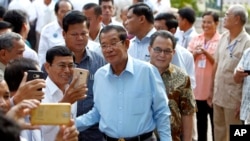As the ruling Cambodian People’s Party of Prime Minister Hun Sen is poised to win this weekend’s Senate election, consolidating the premier’s grip on power, observers have warned that a CPP victory will push the country further towards one-party rule.
Sunday’s election will see 58 of the Senate’s 62 members elected by a vote of members of parliament and more than 11,000 commune councilors across the country. The remaining senators are appointed by parliament and the king.
Yong Kim Eng, president of the People Center for Development and Peace (PDP-Center), said the CPP was now unchallenged, having removed all checks and balances on its rule.
“We are concerned about it because a democratic process legislative functions should have a system of checks and balances. There is no other party in any of the legislative branches that can check, debate, discuss the important work of the government effectively,” he said.
The CPP dissolved the country’s main opposition party, the Cambodian National Rescue Party, in November. The CPP went on to take most of the 5,007 commune seats that the CNRP won at the last local elections, giving it a huge majority in the Senate election.
Schanley Kuch, a Cambodian political analyst residing in Maryland, said the CPP would take any measures possible to win the Senate election
“Cambodia will have a one-party government. It totally contradicts what it has stipulated in the Cambodian constitution,” he said.
“If the government is under an individual, there will not be checks and balances,” he added.
Korn Savang, an election monitor at Comfrel, said no party was in a position to challenge the CPP in the election. “We can see that almost 100 percent of the voters are from the ruling party,” he said.
Sam Kuntheamy, executive director of the Neutral and Impartial Committee for Free and Fair Elections in Cambodia (NICFEC), said the ruling party will win almost all of the seats in the election.
“There can’t be checks and balances because there are only 44 members of the parliament from new parties and the CPP controls 79 seats. And then there are 58 senators ... so almost all are under the control of the ruling party.”
Sok Eysan, a ruling party spokesman, denied that the CPP was forming a one-party system.







